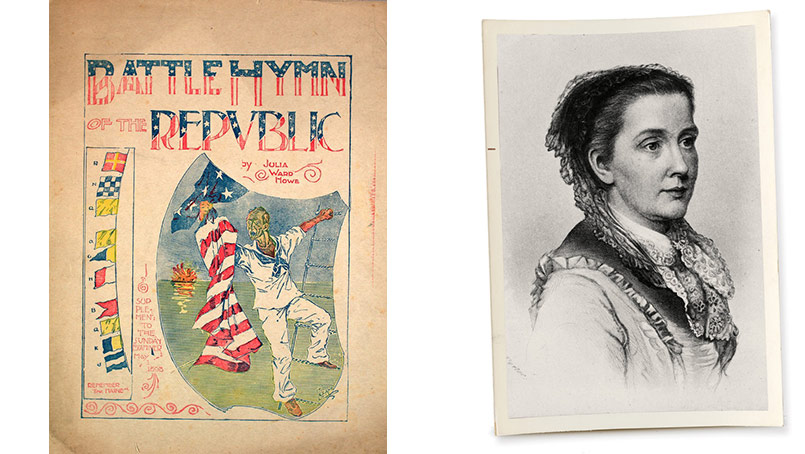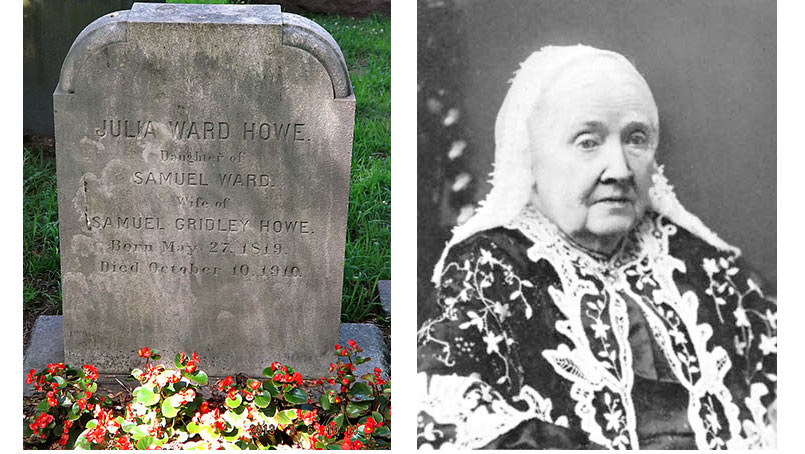
31 Mar An Anthem for Five Dollars: Julia Ward Howe’s Battle Hymn and the Old Corner Bookstore
Ticknor and Fields’ shop at the corner of School Street and Washington Street published iconic literary works like Henry David Thoreau’s Walden Life in the Woods and Nathaniel Hawthorne’s The Scarlet Letter. Over the course of 75 years, the corner store was home to ten publishers. From 1833 to 1864, Ticknor, joined later by Fields, published out of the Old Corner. (For a full list of publishers, click here.) Published in 1862, the duo paid Julia Ward Howe five dollars for her poem “Battle Hymn of the Republic”.
Dubbed the “Dearest Old Lady of America”, Julia Ward Howe was a renowned social activist, poet, and playwright. A founder of the American Woman Suffrage Association, Howe did not live to see the 19th Amendment to the Constitution, but is best known for her moving poem, “The Battle Hymn of the Republic”, written during the American Civil War, which rallied Union support of the war and opposition to slavery.
Born on May 27, 1819, Howe was fourth of seven children of Wall Street banker Samuel Ward and poet Julia Rush Ward, who died shortly after giving birth to her seventh child. As a child, Howe was educated by her an aunt, who tutored her in literature, languages, and science. Howe developed a love of poetry and was published anonymously as a young woman in a number of literary magazines.

After the death of her father in 1839, Howe visited friends in Boston and was introduced to noted writers, including, Ralph Waldo Emerson and Margaret Fuller. During her time in Boston, Howe visited the New England Institute for the Blind (today’s Perkins School for the Blind) with poet and friend Henry Wadsworth Longfellow. Howe met the institution’s director, Dr. Samuel Gridley Howe, whom she married soon after meeting. Dr. Howe was an advocate for the education of the blind and traveled to fifteen states support schooling programs for the blind around the United States. Dr. Howe also founded the anti-slavery newspaper, The Boston Daily Commonwealth, which Julia helped to edit. The couple also both devoted themselves to the Sanitary Commission during the Civil War. Though they shared a dedication to social activism, their troubled marriage was the inspiration for many of her grim poems and plays about her unhappiness with her husband.
During the Civil War, Howe’s work for the US Sanitary Commission, which promoted clean and hygienic conditions for soldiers and hospitals. After the war ended, Howe founded the New England Suffrage Association in 1868, as well as the Massachusetts Woman Suffrage Association. The women of the National Woman Suffrage Association (NWSA) were undecided over whether to support the 15th Amendment, which promised voting rights for black men but not all women. Howe joined Bostonian Lucy Stone in founding a new organization the American Woman Suffrage Association (AWSA), which championed the Fifteenth Amendment, and broke with Susan B. Anthony and Elizabeth Cady Stanton’s NWSA. Howe established the AWSA’s newspaper, the Woman’s Journal, which she edited for 20 years. In 1889, the groups reunited as the National American Woman Suffrage Association with the singular goal of votes for women. Having lived through the carnage of the American Civil War, Howe also became a peace advocate, presiding over the Women’s International Peace Association in 1871. She lectured widely, particularly for the Unitarian Church. In 1873, she organized the Association for the Advancement of Women to improve women’s education and entry into the professions.
Howe’s written works spanned a variety of genres and topics. In the 1860, Howe traveled to the island of Cuba, Jamaica, and Dominica, where she recorded her experiences visiting churches, prisons, sugar plantations, and markets. In a commissioned publication for Ticknor and Fields, she wrote an extended description of her trip: “So the world to the slave is a debtor’s prison, with a good or bad Jailer, and for utmost alleviation, an occasional treat all round. And while the cooking, and chattering, and ironing goes on about us, Reader, you and I will ponder this, sitting by the well, under the stars set an hundred thousand miles deep in the dark velvet of the tropical heavens.”

In 1862 Howe’s poem, “The Battle Hymn of the Republic”, was published by famed Boston publishers Ticknor and Fields’s Atlantic Monthly, for which she was paid five dollars. Howe’s poem was adapted from a tune and lyrics that is suspected to have been written by William Steffe about 1856. According to the Library of Congress, the song first gained popularity around Charleston, South Carolina, where it was sung as a Methodist Camp Meeting song, particularly in churches belonging to free Blacks. It was later used as a marching song on army posts, but the song gathered new verses following the insurrection at Harper’s Ferry, led by John Brown and carried out by a cadre of nineteen men on October 16, 1859. Brown’s actions, trial and subsequent execution made him a martyr to Abolitionists and African-Americans. Howe’s adaptation would become an anthem for both the Union and Confederate soldiers. Howe was one of a group of influential women whose work was published by Ticknor and Fields; Harriet Beecher Stowe’s Uncle Tom’s Cabin was published in 1850 and reprinted immediately after it was sold out.
After her husband’s death in 1876, Howe wrote a flattering biography about his life, despite their unhappy marriage. She also continued to publish poems, essays, and books throughout the 1880s and became the first woman elected to the American Academy of Arts and Letters in 1908. She later received an honorary degree from Smith College where she was declared, “[a] Poet and Patriot, lover of letters and learning; advocate for over half a century in print and living speech of great cause of human liberty…” Howe died of pneumonia October 17, 1910, at her home in Portsmouth, Oak Glen, at the age of 91 Howe is buried in the Mount Auburn Cemetery in Cambridge, Massachusetts.
Selected works, published at Boston’s Old Corner Bookstore
Poetry:
Passion Flowers: Ticknor and Fields publication, 1854
Words for the Hour: Ticknor and Fields publication, 1857
Plays:
Lenora or The World’s Own, Ticknor and Fields publication, 1857
Travel:
A Trip to Cuba, Ticknor and Fields publication, 1860



